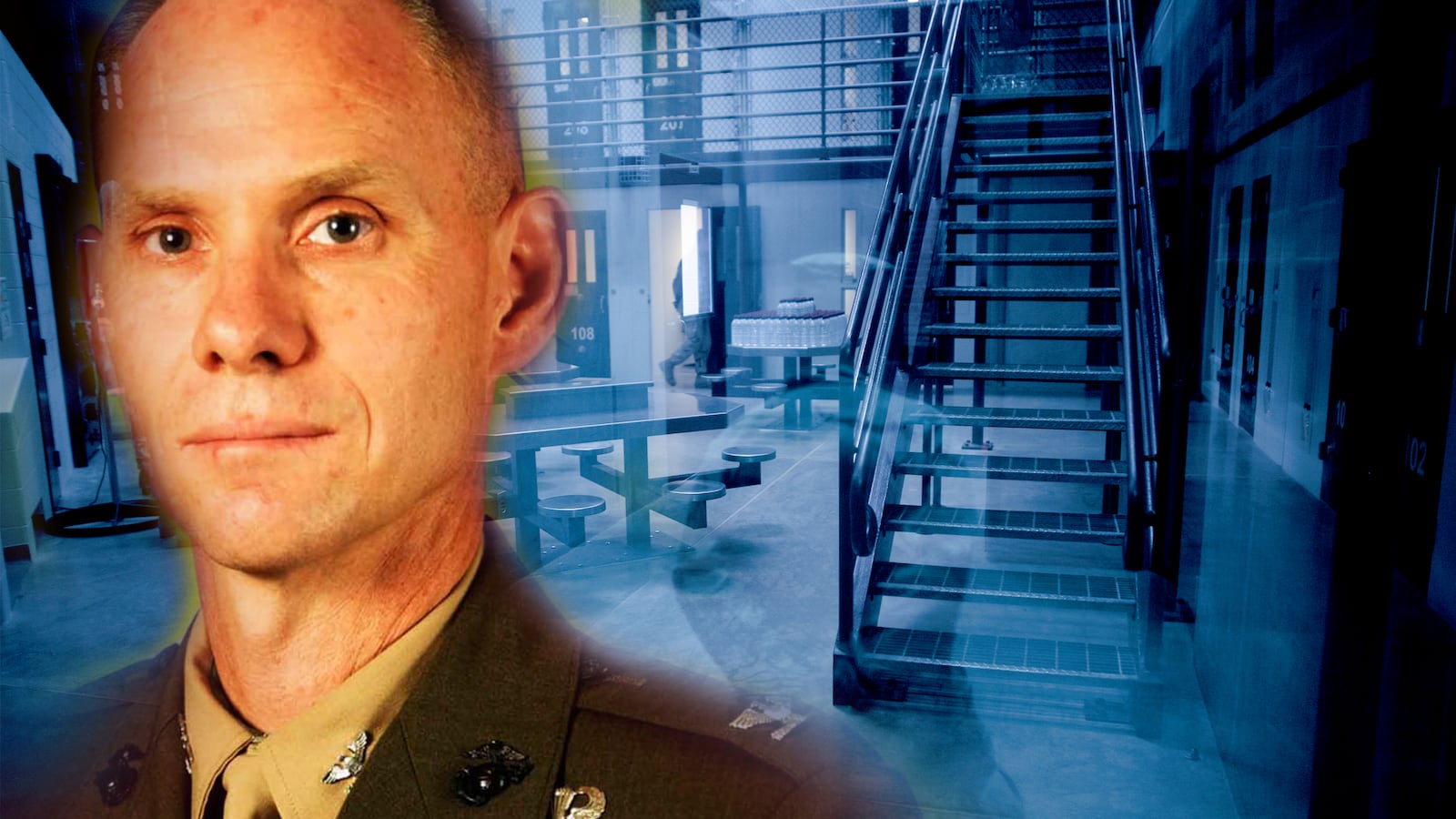Marine Brigadier General John Baker is no longer the 42nd Guantanamo Bay detainee. But that doesn’t mean his unexpected conviction in the Gitmo war courts is overturned.
Shortly before attorneys for Baker arrived in federal court to seek the Marine general’s freedom, military commissions convening authority Harvey Rishikof ruled that Baker does not have to serve his remaining 19 days of confinement at his Guantanamo Bay quarters.
Yet, in a microcosm of the procedural snarls that have afflicted the post-9/11 military commissions, Rishikof has yet to decide if he even has the authority to overturn Baker’s conviction – which came after a dramatic clash with a respected commissions judge, Air Force Col. Vance Spath.
Even though he is, for now, convicted for contempt of court, Baker will largely continue in his responsibilities overseeing military commissions attorneys for the detainees.
Separately, a federal judge showed reluctance to take over a matter from within the military justice system. That judge, Royce Lamberth, punted on Friday over intervening in the Baker case. Lamberth said he would grant an unspecified “reasonable amount of time” to Rishikof to settle the issue of Baker’s conviction. Baker’s attorneys had argued that Spath lacked the authority to convict Baker under the Military Commissions Act of 2009. But Lamberth left himself open to stepping in should Rishikof dither or uphold the conviction.
Baker is the chief defense counsel in the military commissions. At issue was a showdown over suspicions that the government, again, had placed the defense attorneys for a Guantanamo detainee under surveillance. When the lawyers for the accused USS Cole bomber quit in protest, the judge in the case, Spath, rejected their resignation. Baker, however, backed the attorneys – prompting Spath to convict and sentence Baker, who outranks the judge, to 21 days’ confinement in his Guantanamo quarters on Wednesday.
Hours after the conviction, the Pentagon said that Rishikof “will determine whether to affirm, defer, suspend or disapprove the sentence in the next few days,” according to detentions spokesman Maj. Ben Sakrisson.
But attorneys for Baker wasted no time filing a petition in federal court to void the conviction and free the general, arguing that Spath exceeded his authority as commissions judge.
In a sign of how unexpected the general’s conviction was, the Pentagon said Baker would continue to serve as chief of defense counsel even under confinement, though Baker had to cede oversight of Abd al-Rahim al-Nashiri’s defense to his deputy, Col. Wayne Aaron – meaning that Baker and Spath will not face off again in the war court.
Baker “is not prohibited from having communications” with outsiders, Sakrisson explained.
Lamberth’s decision leaves Baker’s case in Rishikof’s hands. Where it leaves the military commissions is a different story.
“I’m hopeful Judge Lamberth will decide to act because too many courts decide they don’t want to touch this convoluted, fake legal system,” said Defense Department lawyer Alka Pradhan, who represents a Guantanamo detainee before the commissions.
“Today Judge Lamberth showed a willingness to sort through this statutory morass and come to an equitable solution for General Baker.”
Though successive administrations have sought to portray the tribunals as legitimate, they have endured years of procedural uncertainty; government subversion through surveillance on the defense teams and outright censorship of the hearings; concerns over unfairness stemming from defense teams’ insufficient access to classified information; and the absence of high-profile terrorist convictions – courts have overturned four of the eight government victories in the commissions’ 16 years – that are central to their rationale for existing. Now they have turned on their own.
“The withdrawal of al-Nashiri’s defense counsel due to ethical concerns and the subsequent Court-issued contempt order and jailing of the Chief Defense Counsel for the Military Commissions Defense Organization, a Brigadier General, reflect the continued erosion of a flawed and potentially unworkable system,” said Katya Jestin, part of the team defending Majid Khan, who pleaded guilty in a rare commissions success.
“More than five years ago, Mr. Khan made a decision to cooperate with the government in the Military Commissions system, and he continues to be unwavering in that commitment. But these events, as well as recent events in other cases, demonstrate that despite Mr. Khan’s ongoing cooperation in the Military Commissions, that system is threatening to collapse entirely. Indeed, the recent controversy is only the latest in a seemingly endless stream of incidents undermining the legitimacy of the Military Commissions, which we as lawyers cannot ignore.”
Col. Spath seemed to back away from a different precipice during Friday’s hearing. He issued from the bench at the war court orders not to arrest the Pentagon lawyers who quit Nashiri’s death-penalty case. Some of their colleagues speculated that Spath wished to appear more reasonable ahead of Baker’s habeas hearing, following two days of highly negative press coverage.
Currently the chief trial judge of the U.S. Air Force, Spath has 25 years of experience in the service’s judge advocate corps. He has a reputation as “a fair judge and a patient judge and a measured judge,” said retired Col. Don Christensen, a former chief prosecutor for the Air Force, who considers Spath a friend as well as a respected colleague.
“I don’t know if I would have done the same thing, but I will say one of the frustrations of being a military judge versus a civilian judge is you don’t often have the same tools that the civilian judge does,” Christensen said.
“The whole military commissions process is a mess. This hasn’t been a shining moment of U.S. jurisprudence. It’s got to be tough to be a judge in this – obviously, it’s not working.”
Jestin, who was not speaking for her law firm, said the Baker episode provided another argument for trying terrorists in civilian federal courts.
“Put bluntly, these distractions would not and do not occur in Article III courts. That is where these cases should be,” Jestin said.






